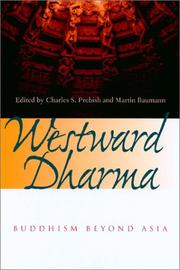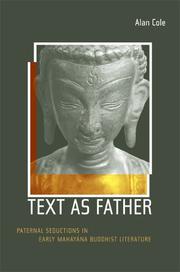| Listing 1 - 4 of 4 |
Sort by
|
Book
ISBN: 4906267262 9784906267262 Year: 1992 Publisher: Tokyo : International institute for Buddhist studies,
Abstract | Keywords | Export | Availability | Bookmark
 Loading...
Loading...Choose an application
- Reference Manager
- EndNote
- RefWorks (Direct export to RefWorks)
Buddhism --- Study and teaching. --- International Institute for Buddhist Studies.
Book
ISBN: 9783937816623 3937816623 Year: 2010
Abstract | Keywords | Export | Availability | Bookmark
 Loading...
Loading...Choose an application
- Reference Manager
- EndNote
- RefWorks (Direct export to RefWorks)
In this book, Bhikkhu Anālayo investigates the genesis of the bodhisattva ideal, one of the most important concepts in the history of Buddhist thought. He brings together material from the corpus of the early discourses preserved mainly in Pāli and Chinese that appear to have influenced the arising of the bodhisattva ideal. Anālayo convincingly shows that the early sources do not present compassionate concern for others as a motivating force for the Buddha's quest for awakening. He further offers an analysis of the only reference to Maitreya in the Pāli canon, showing that this reference is most likely a later addition. In sum, Bhikkhu Anālayo is able to delineate a gradual genesis of central aspects of the bodhisattva ideal by documenting (1) an evolution in the bodhisattva concept reflected in the early discourses, (2) the emergence of the notion of a vow to pursue the path to buddhahood, and (3) the possible background for the idea of a prediction an aspirant to buddhahood receives from a former buddha.

ISBN: 1282359592 1597349941 9786612359590 0520936582 9780520936584 1417522887 9781417522880 9780520226258 0520226259 9780520234901 0520234901 9781597349949 0520226259 0520234901 9781282359598 Year: 2002 Publisher: Berkeley University of California Press
Abstract | Keywords | Export | Availability | Bookmark
 Loading...
Loading...Choose an application
- Reference Manager
- EndNote
- RefWorks (Direct export to RefWorks)
The first authoritative volume on the totality of Buddhism in the West, Westward Dharma establishes a comparative and theoretical perspective for considering the amazing variety of Buddhist traditions, schools, centers, and teachers that have developed outside of Asia. Leading scholars from North America, Europe, South Africa, and Australia explore the plurality and heterogeneity of traditions and practices that are characteristic of Buddhism in the West. This recent, dramatic growth in Western Buddhism is accompanied by an expansion of topics and issues of Buddhist concern. The contributors to this volume treat such topics as the broadening spirit of egalitarianism; the increasing emphasis on the psychological, as opposed to the purely religious, nature of practice; scandals within Buddhist movements; the erosion of the distinction between professional and lay Buddhists; Buddhist settlement in Israel; the history of Buddhism in internment camps; repackaging Zen for the West; and women's dharma in the West. The interconnections of historical and theoretical approaches in the volume make it a rich, multi-layered resource.
Globalization --- Buddhism --- Buddha and Buddhism --- Lamaism --- Ris-med (Lamaism) --- Religions --- Religious aspects --- Buddhism. --- History --- Missions --- History. --- Buddhism - Missions - History --- Buddhism - History - 20th century --- Globalization - Religious aspects - Buddhism --- asia. --- australia. --- buddhism scholars. --- buddhism. --- buddhist practices. --- buddhist studies. --- buddhist teachings. --- buddhist traditions. --- comparative religions. --- dharma. --- diaspora. --- egalitarianism. --- ethics. --- europe. --- global religion. --- history of buddhism. --- israel. --- north america. --- psychology. --- religious philosophy. --- religious scholars. --- south africa. --- theoretical approach. --- theoretical perspective. --- western buddhists. --- western philosophy. --- western thought. --- western world. --- zen.

ISBN: 9786612357589 0520931408 1282357581 1598755412 9780520931404 1417595876 9781417595877 9781598755411 9780520242760 0520242769 9781282357587 6612357584 Year: 2005 Publisher: Berkeley Los Angels University of California Press
Abstract | Keywords | Export | Availability | Bookmark
 Loading...
Loading...Choose an application
- Reference Manager
- EndNote
- RefWorks (Direct export to RefWorks)
This beautifully written work sheds new light on the origins and nature of Mahayana Buddhism with close readings of four well-known texts-the Lotus Sutra, Diamond Sutra, Tathagatagarbha Sutra, and Vimalakirtinirdesa. Treating these sutras as literary works rather than as straightforward philosophic or doctrinal treatises, Alan Cole argues that these writings were carefully sculpted to undermine traditional monastic Buddhism and to gain legitimacy and authority for Mahayana Buddhism as it was veering away from Buddhism's older oral and institutional forms. His sophisticated and sustained analysis of the narrative structures and seductive literary strategies used in these sutras suggests that they were specifically written to encourage devotion to the written word instead of other forms of authority, be they human, institutional, or iconic.
Mahayana Buddhism --- Paternalism --- Parentalism --- Social classes --- Social control --- Social systems --- Doctrines. --- Religious aspects --- Mahayana Buddhism. --- Sacred books. --- Mahayana Buddhism - Sacred books. --- Paternalism - Religious aspects - Mahayana Buddhism. --- Mahayana Buddhism - Doctrines. --- asian. --- buddhism. --- buddhist books. --- buddhist monk. --- buddhist studies. --- china. --- chinese buddhism. --- diamond sutra. --- eastern philosophy. --- eastern religion. --- lotus sutra. --- mahayana. --- meditation. --- mindfulness. --- monastic buddhism. --- monasticism. --- monk. --- nonfiction. --- philosophy. --- religion. --- spirituality. --- sutra studies. --- sutra. --- sutras. --- tathagatagarbha sutra. --- vimalakirti nirdesa.
| Listing 1 - 4 of 4 |
Sort by
|

 Search
Search Feedback
Feedback About UniCat
About UniCat  Help
Help News
News